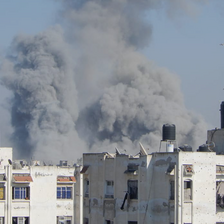The Electronic Intifada 2 October 2024

Israel’s bombardment has all but leveled Hamad City, a Qatari-funded apartment complex in Khan Younis.
Despite the danger posed by the invading Israeli army, Mahmoud was determined not to leave his home in Khan Younis near the Sunniyya roundabout since the beginning of the genocide in October 2023.
He, his wife, two young sons aged 7 and 10 and other family members were all sheltering in a two-story house.
In December, when the Israeli army ordered the evacuation of Khan Yunis, Mahmoud’s mother and sisters fled to Rafah. But his wife, two sons and he remained on the first floor of their home.
In January, the second floor of their house was hit in an Israeli attack, causing severe damage. The two children were traumatized. And the whole family was scared to leave the house, which by then had Israeli tanks stationed on all sides.
Their only option was to go down to the basement.
Their basement was really a storage area. It has no windows and no sunlight. But it was safer than being over ground. Outside was a battle zone and the resistance fought constant running battles with the Israeli army.
The tanks and bulldozers destroyed everything in their path. Rubble piled up at the door of the basement, trapping Mahmoud and his family inside.
For two days, the family watched their provisions dwindle. But outside, the fighting subsided and once the tanks and bulldozers retreated, resistance fighters came to the family’s aid, clearing the rubble and bringing them food before disappearing again.
It was a relief for the family, but provisions soon ran out again, and Mahmoud was forced to venture out to get food.
The family spent months in the basement. Eventually they left. When they did, they had been so long out of daylight that all suffered some damage to their vision.
The family has now joined other displaced people in Khan Younis itself.
A foretelling
Dana was three months pregnant with her first child when the Israeli attacks started last October.
Luna, the youngest of Dana’s five sisters, told me about Dana, 24.
Dana married Dr. Tawfiq al-Farra, a dentist, four months before the war. They dreamed of starting a family together.
They were living in an apartment in Hamad City, an apartment complex in Khan Younis in the central Gaza Strip, when the Israeli attacks began last October.
Dana left their apartment to stay with her parents. Her father, Hassan al-Saqqa, who is also a doctor, was still working. But his car had been destroyed by an Israeli missile and he had to find other ways of getting to work, a worry to his family.
Every day, Dana would send her father messages to be sure he had arrived safely and to ensure he would keep them informed.
But then Dana disappeared.
On 23 October, she was at her parents’ house with Luna, cleaning a home that has now become a shelter for many displaced people. Dana prayed and left without saying goodbye to anyone.
“I called her to scold her about leaving like that,” Luna said. Dana told her she planned to return two days later on 25 October.
“On that morning, I woke up to a call from my friend who lives across from Tawfiq’s family home,” Luna said. The friend asked whether Dana and Tawfiq were with her.
“I immediately felt something had happened. My worst fears were confirmed when my friend told me that Tawfiq’s family home had been targeted,” Luna told The Electronic Intifada.
“Neither my mother nor I believed it at first, but another doctor informed my father that Tawfiq’s father’s house had been bombed, and they went to retrieve the martyrs.”
Dana’s father also recalled that day with a shudder.
“I had to try to identify my daughter, searching through torn clothes and severed limbs,” Hassan recalled. “Is this Dana’s? Is this Dana’s foot? I found nothing.”
The other doctors informed him however that there was a body in a hospital morgue that might be Dana’s. It was indeed her, as confirmed by her brother, Ali.
“My father and brother brought Dana’s body home for farewell, but we still can’t grasp the pain of losing her. Neither I nor my siblings abroad can comprehend it,” Luna said.
One sister, Rama, lives in Turkey, and “ran into the street when she received the news, unable to process the shock.”
Another sister, Dima, who lives in Germany, was suffering from postpartum depression when she learned about Dana. She locked herself in her room and has barely spoken to anyone since, according to Luna.
“For me, Dana was everything. She was my roommate, my confidante and my role model. I learned right from wrong from her,” Luna said.
In her last post on X, Dana confessed something she had always suspected.
“I feel like I will die young; this feeling has always accompanied me.”
Dana’s body was recovered on the day of the bombing, but 12 other victims remained trapped for several days due to a lack of resources.
The next day the body of Luna’s close friend Hala was brought out, and on the third day they found Tawfiq’s body, which was so decomposed, his mother was not allowed to see it.
Donya Ahmad Abu Sitta is a writer in Gaza.





